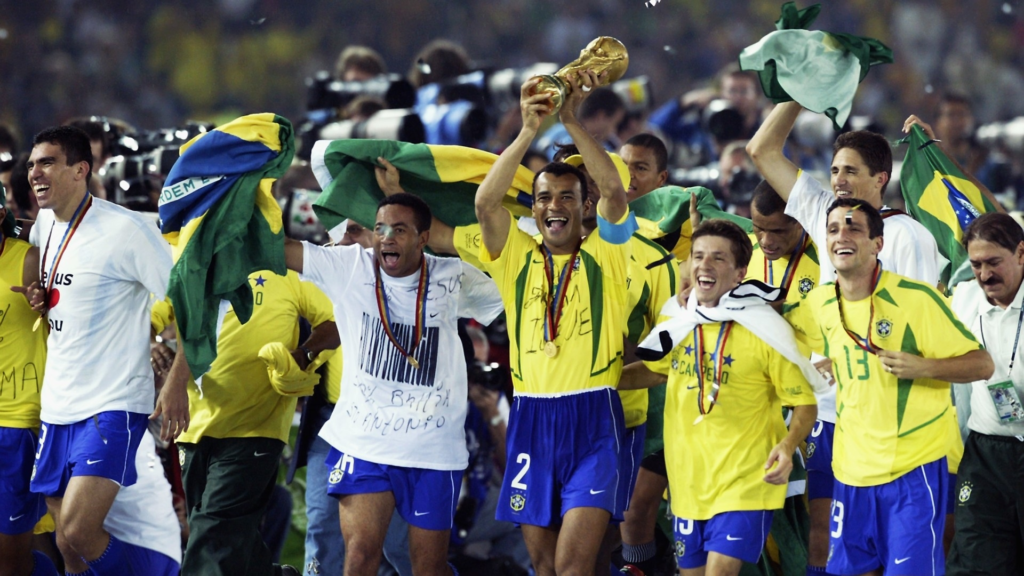The 2022 World Cup in Qatar is just around the corner and excitement is building all the time towards soccer’s biggest event. That excitement also means looking back at previous editions of FIFA’a showpiece, and what better World Cup to look back to than the one that took place 20 years ago in Japan and South Korea between Friday, May 31 and Sunday, June 30 of 2002.
Who won the World Cup 2002? The 2002 FIFA World Cup was won by Brazil who beat Germany 2-0 in the final in Yokohama, Japan, thanks to a pair of second-half goals from Ronaldo. It was a tournament full of upsets, something that was shown by the third-place play-off that saw Turkey beat South Korea 3-2 in a game that neither nation was expected to reach prior to the start of the World Cup that year.

The 2002 World Cup was unique right from the start. It was the first World Cup ever to be hosted outside of Europe and the Americas. It was also the first World Cup to be hosted by more than one nation, with Japan and South Korea teaming up to stage an event that was universally acclaimed for its cleanliness, welcoming nature of the hosts, and facilities.
The win for Brazil was their fifth overall World Cup title. This made them the first (and still only) nation to have lifted the trophy on five occasions. There was also one aspect of the game that this World Cup was the last for as it was the final time that the golden goal rule would be used in extra time to determine the winner of a match by the first goal scored during that period.
Group Stages
The Group stages of the 2002 World Cup were madness. Defending champions France crashed out in miserable style, picking up just one point and finishing bottom of Group A. It started terribly for the French, playing without the injured Zinedine Zidane, as they lost the opening game of the tournament 1-0 to a debuting Senegal side in stunning fashion. Thierry Henry was sent off in their 0-0 draw with Uruguay, before a 2-0 defeat by Denmark dumped them out with the worst record of any World Cup holder in history (other than Uruguay who decided not to defend their title in 1934).
The French had great company in group stage ineptitude. A pre-Cristiano Ronaldo Portugal finished third in Group D behind South Korea and the United States, while Argentina finished third in the Group of Death behind England and a Nigerian side at the peak of their powers with the likes of Jay-Jay Okocha and Nwankwo Kanu pulling the strings. This was one World Cup too early for Lionel Messi, but Argentina was blessed with a squad featuring Gabriel Batistuta, Ariel Ortega, and Juan Sebastian Veron, so their Group F exit was certainly a surprise.
Knockout Stage
The weirdness continued into the knockout stages with teams like Senegal, Turkey, and the two host nations giving the Round of 16 a very different feel to a traditional World Cup. Germany was “incredibly German” all the way to the final, beating Paraguay, the USA, and South Korea 1-0 in each game to book their place in Yokohama. One big problem for Germany, and it caught up with them in the final, was the star midfielder Michael Ballack picked up a yellow card in the semi-final against South Korea and was therefore ineligible for the final.
Brazil was more free-scoring than Germany in reaching the final as they first beat a not yet ready for primetime Belgium 2-0 in the Round of 16. The Brazilians also saw the end of England in the 2002 World Cup at the quarter-final stage as their 2-1 win featured THAT free kick by Ronaldinho that floated over the head of England goalkeeper David Seaman and into the top corner of the net.
Ronaldo scored a second-half goal to see Brazil into the final as they beat a rugged Turkish side 1-0 in the game that saw Rivaldo get hit in the knee so hard with the ball by Turkey player Hakan Unsal that he went down clutching his face. One of the worst dives/moments of play-acting in the history of the World Cup resulted in a red card for Unsal late in the game.
The only other two major nations that made the Round of 16 were Italy and Spain. Italy bowed out in the Round of 16 when they lost to South Korea via a golden goal. It was a controversial game (Italy had a goal disallowed for the fifth time in the tournament in extra time), and while Francesco Totti was sent-off, multiple other players easily could have been.
That controversy, however, was nothing compared to the quarter-final win for South Korea over Spain. South Korea won 5-3 on penalties, but only after Spain had two goals disallowed in the game. Add in a number of offside flags that wouldn’t pass the test in our VAR world and it is easy to see why some call this the worst refereeing performance in a World Cup quarter-final of all time.
The Final
Despite their combined success in the 72-year history of the World Cup, this was the first time that Germany and Brazil had ever met in a final. Ronaldo’s two goals saw him win both the final for his team and also cemented him in as the Golden Shoe winner as the tournament top scorer with eight goals. Germany goalkeeper Oliver Kahn was not only the Golden Glove winner,r but also the first (and to date only) goalkeeper to win the Golden Ball as the best player of the tournament. This was thanks to his string of stunning performances in the knockout rounds leading up to the final
Brazil became the first team since 1970 to win every match at a tournament and the first since 1986 (Argentina) to win the World Cup without requiring a penalty shoot-out at any stage to progress. The team that featured players like Cafu, Roberto Carlos, Rivaldo, Ronaldinho, and, of course, Ronaldo, is seen as one of the most star-studded brazil sides of the last 50+ years.
